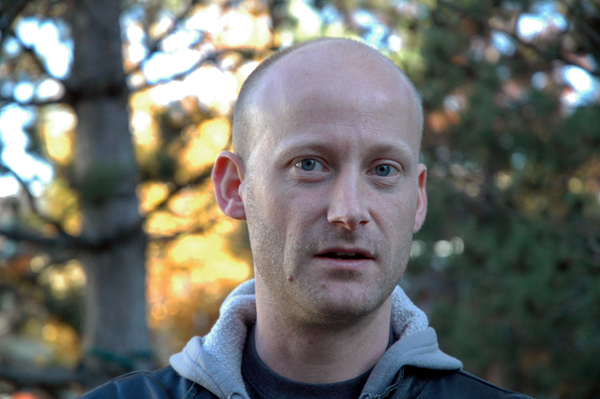Negotiations over, U-Pass program to go to vote
November 6, 2010 by Jeff Groat

KSA director of external affairs, Matt Todd, is concerned that students will need to wait even longer for a U-Pass. Todd hopes the U-Pass referendum will be held in February. Photo By Jeff Groat
A week ago, the Kwantlen Student Association postponed a referendum on the U-Pass as negotiations hadn’t reached a conclusion before a target date set by TransLink set. This week, the negotiations were finalized, pending working out details in a couple areas.
The result is a recommendation that students vote in February 2011 to accept or reject a U-Pass.
One area that still needs to be worked out is the wording of the contract to include Adult Basic Education (ABE) students in the U-Pass program. ABE students are mature students who did not graduate from high school but are upgrading some education to continue in university education. Originally, these students were not included in the U-Pass program, since ABE credits do not count as regular full-time credits like most other courses do.
Another, more finicky area, concerns students who withdraw from courses after they receive a U-Pass.
Hypothetically, it may be possible for a student to register for one class, receive a U-Pass, then withdraw from that class. In this case, TransLink would charge Kwantlen an additional $50 to make up the difference between a U-Pass and a regular one-zone buss pass, as this person would no longer be considered a student at Kwantlen.
The problem lies in the fact that Kwantlen does not have the means to collect this fee from the student, and is wrestling with the question of whether a student can be prevented from registering for classes before paying back the institution.
Matt Todd, the Kwantlen Student Administration’s director of external affairs, said, “the university has this dilemma of would we really prevent somebody from furthering their post secondary education because they didn’t pay for their U-Pass?”
At the table, Kwantlen failed to negotiate an increase in the exemption limits from one to five per cent, something that Kwanten believes is a problem unique to the Fraser Valley.
“Because most of those students [in the valley] go to Kwantlen, we feel that this is a problem that is special to Kwantlen,“ Todd said.
The student association expects roughly five per cent of students will want to be exempt from paying for and using their U-Pass, because of a lack of reliable and frequent transit access in some communities of the valley. These students would be forced to pay for a U-Pass that they are likely to not use.
“We don’t think that’s fair to students,” Todd said.
According to Todd, there are two options: “Better service or exempt those students.”
If approved, the U-Pass system will be a two-card system for at least two years or until TransLink implements a smart-card electronic fare system.
This means the KSA will incur the costs of redesigning new student ID cards that include some features required by TransLink, as well as the U-Pass card itself. There are other expenses for implementing the U-Pass, such as hiring staff to deal with the new program, training staff and buying new software. All these costs are paid by participating schools and only an increase in student fees would pay for this.
“They have come to the table, they’ve made a big investment, but I don’t think [the province] realized how much it was going to cost,” Todd said.
Todd is recommending that the referendum be held in the first week of February next year.



I would think it would depend on when a student withdraws. I can enroll in a class or classes and up until the end of the first week of the semester, if I withdraw from it, I can get a percentage of my money back. After the first week, if I withdraw before the withdrawal deadline, I can’t get any money back.
Students withdraw from classes for many different reasons, if it’s sometime after the first week and before the withdrawal deadline, it is usually because of something unfroseen (an accident, illness or problem in the family), or perhaps the student is overburdened with the course load and balancing that with life outside Kwantlen. Whatever the reason, they may drop a course to restore sanity to their life for that semester with the intent of taking additional courses or repeating it later on. They shouldn’t be penalized for dropping the course, even if it is their only course. A simle solution to the problem from this point of view then could be to make the U-Pass not a U-Pass and just for those enrolled in full time studies (9 or more credits).
But that solution doesn’t help Translink as their goal is to get as much money from every student as possible. Currently, as the article points out, not every student uses transit, so Translink is not receiveing money from every student. Under a U-Pass system, Translink gets money from many, many more people than they ever could have dreamed of getting before… so they should just swallow the loss until the technology improves and smart cards are introduced that ideally should have some sort of mechanism to “disable” the card if a student is no longer a student. So perhaps that is the negotiating position Kwantlen could take – a take it or leave it proposition for Translink.
Ultimately, Translink really needs to simplify how it deals with fares. The zone system is ridiculous. It should be something like “$2, 2 hours, wherever you want to go,” with a reasonably priced day and monthly pass for those who may prefer those options. Doing something like that would cut down on the red-tape, the need for programming machines, etc.